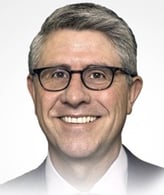
If career moves by former regulators are signs of the times, then J. Christopher Giancarlo could be the contemporary archetype. His first major announcement, after stepping down in 2019 from the Commodity Futures Trading Commission, was to join law firm Willkie Farr & Gallagher, a hardly unconventional step following five years on the commission, the last two as chairman, and 13 years before that as an executive of Wall Street brokerage GFI Group.
But Giancarlo left his mark on the CFTC as an advocate of modernized and digitized regulatory processes, established LabCFTC as the derivatives-oversight agency's focal point for fintech and regtech innovation, and became known as “Crypto Dad” for his interest in and openness to digital-asset products and blockchain technology. Accordingly, in January 2020, he co-founded the Digital Dollar Project, which seeks to encourage discussion and development of a U.S. central bank digital currency. He reportedly took a stake this year in investment firm BlockTower. On April 13, he was named senior adviser of Baton Systems, which applies distributed ledger technology in capital markets.
With the recent transition of administrations in Washington, D.C., other senior financial regulators have gone into the private sector - notably former Securities and Exchange Commission chairman Jay Clayton and top national bank regulator Brian Brooks - with technology and cryptocurrency a common allure.

Clayton, who led the SEC for three and a half years and left in December, returned to law firm Sullivan & Cromwell, became lead independent director of Apollo Global Management, and joined the Academic and Regulatory Advisory Council of One River Digital Asset Management, a crypto offshoot of the One River Asset Management hedge fund. At Apollo, Clayton in March was elected chairman in place of co-founder Leon Black, who became embroiled in the Jeffrey Epstein scandal. In affiliating with One River, Clayton is following a route that other experienced regulators, lawyers and risk managers have taken to help to establish crypto-asset ventures' bona fides.
Brett Redfearn, who was director of the SEC's Division of Trading and Markets, at the end of March was named head of capital markets at Coinbase, the prominent cryptocurrency exchange that had bulked up in legal and compliance talent ahead of its highly anticipated IPO.
Brooks, who was acting Comptroller of the Currency during the final year of the Trump administration, and who was Coinbase's chief legal officer before that, has joined the board of Spring Labs, a well-funded data networking company leveraging cryptographic tools and blockchain technology.
Although not quite in the same vein, Giancarlo's successor as CFTC chief executive, Heath Tarbert, is now chief legal officer of leading high-tech market maker Citadel Securities.
Earlier Movers
Such moves were foreshadowed by the likes of Giancarlo, who is also a director of the American Financial Exchange, which sets the Ameribor benchmark rate; Daniel Gallagher, a former SEC commissioner who became chief legal officer of Robinhood in May 2020, seven months after joining the board of the high-flying investment app platform (and provider of order flow to Citadel Securities); and Sigal Mandelker, who after two and a half years as U.S. Treasury Undersecretary for Terrorism and Financial Intelligence became a general partner of fintech venture capital firm Ribbit Capital in April 2020. Mandelker is also an adviser of Ribbit portfolio company Chainalysis and of the Digital Dollar Project.

Kenneth Blanco, director of Treasury's Financial Crimes Enforcement Network (FinCEN), which Mandelker oversaw, departed April 9 to join a financial crimes unit of Citigroup.
The trend is not confined to federal-level officials. Benjamin Lawsky, who was New York superintendent of financial services from 2011 to 2015 and developed the state's pioneering Bitlicense for crypto-asset businesses, served as a director of Ripple and is currently head of regulatory affairs for institutional investment platform NYDIG. Both of those firms, along with Coinbase and other crypto market leaders, have New York virtual currency licenses. NYDIG and Coinbase, among others, also have limited-purpose trust charters.
Maria Vullo, who succeeded Lawsky as head of the New York Department of Financial Services (DFS), in 2019 became regulator-in-residence, a mentoring role, with the FinTech Innovation Lab. Vullo also joined the board of Emigrant Bank and Emigrant BanCorp, where she is now vice chairman and chief legal officer.
Internationally, Toshihide Endo, commissioner of Japan's Financial Services Agency from 2018 to 2020, joined cryptocurrency exchange DeCurret on April 1 as a special adviser.
One River's Advisers
Jay Clayton is one of a bipartisan trio named on March 29 as members of One River Digital Asset Management's Academic and Regulatory Advisory Council. He and veteran Washington economic advisers Kevin Hassett and Jonathan Orszag were described as “a distinguished group with deep and varying regulatory and policy experience” by Eric Peters, founder, CEO and chief investment officer of One River Asset Management, the Greenwich, Connecticut-based parent, which was founded in 2013 and manages $2.5 billion in institutional assets.

Hassett, vice president and managing director of The Lindsey Group and a Hoover Institution distinguished visiting fellow, was senior adviser to President Donald Trump and chairman of the Council of Economic Advisers from 2017 to 2019. He was previously research director at the American Enterprise Institute, a Federal Reserve senior economist, and a Columbia University faculty member. He was a presidential campaign adviser to Republicans Mitt Romney, John McCain and George W. Bush.
Orszag, an antitrust and competition economist, is a senior managing director and member of the executive committee of Compass Lexecon. He was an economic policy adviser on President Bill Clinton's National Economic Council and served as assistant to the Secretary of Commerce and director of the Office of Policy and Strategic Planning. In that capacity, Orszag was the Commerce secretary's chief policy adviser and was responsible for initiatives ranging from telecommunications issues to international trade.
Clayton, Hassett and Orszag said in a joint statement, “We were impressed by [CEO Peters'] willingness to hear our varying views on the digitization of our monetary, banking and capital markets ecosystem and One River's commitment to transparency. We look forward to working with One River as the effects of digitization on our markets play out across the globe.”
One River intends to “continue to broaden the council to include thought leaders with diverse backgrounds and expertise,” Peters said. "It is crucial to understand how digital assets will interact with existing laws and regulatory bodies, while engaging with governments in an open and transparent manner.
“The One River Academic and Regulatory Advisory Council will help us consider how these new digital systems and the investment opportunities they present will best fit within existing policy, while also helping us think through how to advance these frameworks in ways that ensure the U.S. continues to lead the world in financial innovation and asset management.”
'Reaching Out Proactively”
In common with other entrepreneurs leading disruptive start-ups, Coinbase CEO Brian Armstrong has accepted the inevitability of regulation and even invited it as a sign of legitimacy. In a February Conversations with Tyler (Cowen) podcast, Armstrong said that at an early stage, “we decided we were going to be reaching out proactively to regulators, not waiting for them to come to us. When we reached out to them proactively, we tried to be an educational resource, and we tried to be basically legitimate.”
Armstrong added that “we proactively went out and got licenses before it was even clear that we needed them. We were essentially pushing the industry forward and saying, 'We think this should be a regulated, trusted industry.' Otherwise, we felt like cryptocurrency was always going to be in the shadows, or someone was going to try to shut it down.”
Coinbase nevertheless got slapped in March with a $6.5 million CFTC fine for transaction reporting deficiencies between 2015 and 2018 and for misleading wash trades by a former employee in 2016.
As vice president of product, capital markets, Brett Redfearn is reporting to chief product officer Surojit Chatterjee, who in a March 30 blog said the ex-SEC official “will be responsible for defining and driving a vision and strategy to set the global standard for crypto capital markets, including digital asset securities and our crypto trading platform.”

Chatterjee characterized the hiring as “another milestone,” following a year of rapid growth and international expansion “utilizing the enhanced trading tools from our Tagomi acquisition to win large public clients, and launching a market maker program while building the institutional brand more widely.”
Redfearn led the SEC's Trading and Markets Division from October 2017 through December 2020, with Jay Clayton stating, “We have relied on his steady hand from the onset of the COVID-19 pandemic and, throughout his tenure, his deep understanding of complex issues and market structure. Brett has applied his expertise deftly to assist the commission in getting many important rulemaking and other initiatives across the finish line. It has been a privilege to work with Brett and his team.”
Redfearn previously spent 13 years with JPMorgan Chase & Co., where he was global head of market structure for the corporate and investment bank.
On the legal and compliance side, Coinbase in February recruited Melissa Strait as chief compliance officer, to focus on Know Your Customer (KYC) and anti-money laundering (AML) efforts. Strait had been global head of financial crimes at fintech company Stripe, and before that oversaw compliance operations at Square.
Ian Rooney, after nearly 10 years with Morgan Stanley, started in March as Coinbase's head of enterprise compliance.
In the second half of last year, Paul Grewal, a former U.S. magistrate judge for the Northern District of California and Facebook deputy general counsel, joined the crypto exchange company as chief legal officer, succeeding Brian Brooks; and Milana McCullagh and Katherine Minarik were appointed, respectively, vice president, deputy general counsel - product and commercial, and vice president, deputy general counsel - litigation.
Reaching for Inclusion
Prior to his stints at the Office of the Comptroller of the Currency and Coinbase, Brian Brooks was executive vice president, general counsel and corporate secretary of Fannie Mae; vice chairman of OneWest Bank, with a management team including future Treasury Secretary Steven Mnuchin and Comptroller Joseph Otting; and managing partner of the Washington office of O'Melveny & Myers, where he was also chair of the law firm's financial services practice group.
As a regulator, Brooks vocally supported the OCC's existing “responsible innovation” program, issued a clarification on the legality of banks' crypto-asset custody services, and pushed for special-purpose fintech and payments charters. But in a statement upon joining Spring Labs as its first independent director, as in his January 13 resignation announcement, Brooks highlighted the financial inclusion initiative Project REACh (Roundtable for Economic Access and Change), saying, “I look forward to working with the Spring Labs team to bring the benefits of financial services to more Americans, while reducing cost and increasing security for everyone.”

“Brian has a remarkable perspective on where the industry is headed, and his experience has given him a unique lens on transformative technologies and how they are being adopted,” said Spring Labs co-founder Adam Jiwan. “We are thrilled that he shares our vision as we build the secure rails for data exchange.”
Spring Labs says it is “fundamentally altering the way consumer financial data is stored and shared,” relying in part on a permissioned blockchain maintaining a time-stamped, immutable audit trail for network participants. The technology “offers a unique combination of transparency and privacy that strengthens oversight while also unlocking new data sources that can be used to remove barriers that currently keep as many as 55 million Americans from fully utilizing modern financial services - or from being able to access them at all,” the California-based company explains.
Brooks was a board member of online lender Avant, one of more than 50 financial institution partners of Spring Labs, which has raised over $38 million. The two companies have some investors in common, and there are executive connections: Spring Labs founders Jiwan (executive chairman), John Sun (CEO) and Anna Fridman were, respectively, seed investor/founding board member, co-founder/chief credit officer, and general counsel of Avant.
Founded in 2017, Spring Labs counts among its advisers former Goldman Sachs president Gary Cohn, former TransUnion CEO Bobby Mehta, Capital One co-founder and QED Investors managing partner Nigel Morris, and former Federal Deposit Insurance Corp. chair Sheila Bair.
A Senator for Binance
Binance, which bills itself as the world's largest crypto exchange, has been dogged by reports that regulators are scrutinizing unauthorized transactions within the U.S. The reports prompted a forceful denial in March by CEO Changpeng Zhao, asserting that the company maintains “a very collaborative posture with all agencies around the world” along with “the strongest KYC/AML program in the industry.”

The CEO, who is known as CZ, on March 11 announced that Binance hired Max Baucus, a former Democratic senator from Montana, as a policy and government relations adviser. Baucus served as chairman of the Senate Finance Committee and was U.S. ambassador to China from 2014 to 2017.
Besides “providing guidance and policy advice covering some of the world's most important financial jurisdictions and agencies,” according to a blog entry, Baucus “will also play a key role consulting and liaising with U.S. regulators and authorities on decisive policies that affect the larger global industry and best practices to further guide sustainable developments for Binance and the broader cryptocurrency ecosystem.”
Baucus said in a statement: “Cryptocurrencies and blockchain technology represent some of the most potent forces for change in the global financial systems, potentially driving a revolution in how money is managed leading to a fairer and more equitable financial world. Binance is one of the largest organizations involved in bringing these to the mainstream, and it's a privilege to assist in appropriately navigating the complex political and regulatory frameworks that hold the key to enabling wider adoption.”
CZ said, “We're excited to welcome Max to our team. His experience at the highest levels of government and intimate understanding of global regulation brings exceptional value to Binance and enhances our already strong compliance and policy team.”

Later in March, Binance appointed Rick McDonell and JosÉe Nadeau as compliance and regulatory advisers. McDonell, executive director of the Association of Certified Anti-Money Laundering Specialists (ACAMS), previously was executive secretary of the Financial Action Task Force (FATF) and chief of the UN Global Program Against Money Laundering (GPML).
Nadeau, his partner in McDonell-Nadeau Consultants, formerly headed the Canadian delegation to the FATF and was senior chief of international financial crimes of the Finance Canada department.
“Cryptocurrencies and blockchain technology are gaining widespread adoption, with even traditional banking organizations now offering crypto services,” McDonell and Nadeau said in a joint statement. “These new technologies will certainly change how people and organizations alike manage money. We are both delighted to be working with Binance, one of the leading organizations in this new industry, to ensure it has a world-class compliance and risk management program.”